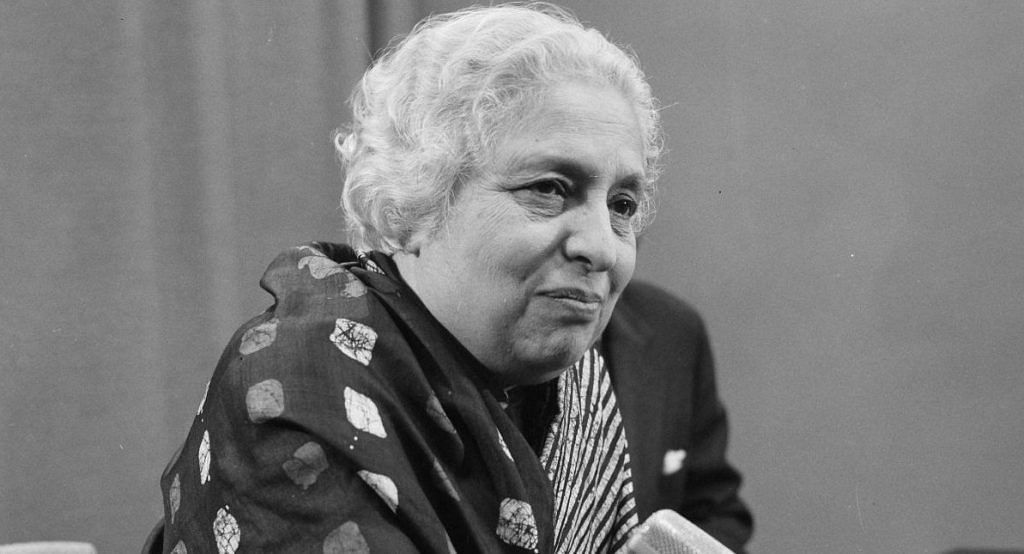18 August is the birth anniversary of Pandit, a freedom fighter, an accomplished diplomat and politician.
New Delhi: Famously known for being the first woman president of the United Nations General Assembly, Vijaya Lakshmi Pandit, the younger sister of Prime Minister Jawaharlal Nehru, scaled great heights and left behind a legacy of her own.
She took part in the country’s freedom struggle, served as a diplomat before carving out a political career, which included slamming niece Indira Gandhi for the imposition of Emergency and contesting for the President’s post.
Also read: Remembering Shaheed Udham Singh, the revolutionary who avenged Jallianwala Bagh
Early years, the pre-Independence era
Born in 1900 to Motilal Nehru and Swarup Rani Nehru in Allahabad, Vijay Lakshmi Pandit married Ranjit Sitaram Pandit in 1921.
In 1937, she won the elections to the provincial legislature of the United Provinces. During this time, she was made the minister of local self-government and public health, making her the first woman in pre-independent India to hold a cabinet position.
She, however, resigned along with her colleagues in the Congress in 1939 to protest against the involuntary participation of British India in the Second World War.
She was arrested and imprisoned thrice during the freedom struggle — in 1932-1933, 1940, and 1942-1943.
Pandit was the president of the All-India Women’s Conference between 1941 and 1943 and mobilised opinion in favour of gender rights and women’s welfare. In 1942, when the Quit India movement was at its peak, both Pandit and her husband were arrested by the British. Her husband died in January 1944.
After her release from prison, Pandit led the Indian delegation to the Pacific Relations Conference in the United States in 1945, along with other leaders of the freedom struggle such H.N. Kunzru and B. Shiva Rao. The conference was held in Virginia, to discuss and debate the possible shape of the post-Second World War world.
At the conference on the Charter of the United Nations in San Francisco in 1945, Pandit made a case for colonies like India as an unofficial delegate. She referred to the British Indian representatives as ‘British stooges’ who had no idea about the sufferings of the colonies. After her return to India, she became a member of the Constituent Assembly in 1946 from the United Provinces.
The diplomat, helming the UN General Assembly
Vijaya Pandit was the head of the Indian delegation to the United Nations in 1946-48, and again in 1952-53. She was appointed as ambassador to the Soviet Union in 1947, where she served till 1949, upholding India’s interests in the early years of the volatile Cold War era. From 1949 to 1951, she was India’s ambassador to the United States of America and Mexico.
In 1953, Pandit became the first woman to preside over the United Nations General Assembly. She headed the eighth session of the General Assembly.
Between 1954 and 1961, Pandit served as India’s high commissioner to the United Kingdom, as well as the ambassador to Ireland. She played a major role in transforming India-Britain relations in the early decades of India’s independence, especially in the immediate aftermath of the nationalisation of the Suez Canal and the crisis that followed in 1956. She had also been India’s ambassador to Spain from 1958 to 1961.
After her return to India in the early 1960s, she became the governor of Maharashtra for a brief period from 1962 to 1964.
Political career
After the death of her brother and India’s first prime minister, Jawaharlal Nehru, in 1964, Pandit fought the Lok Sabha elections from his erstwhile constituency of Phulpur and became a Member of Parliament between 1964 and 1968.
Although she left politics in the late 1960s, her commitment to freedom pushed her back into the Indian polity in the 1970s. She protested fiercely against her niece and then prime minister, Indira Gandhi, when she imposed an emergency in 1975.
With the sudden demise of Fakhruddin Ali Ahmed, the fifth President of India, Vijaya Pandit entered the electoral fray for the post. Although Neelam Sanjiva Reddy was eventually elected, she travelled across the length and breadth of the country addressing rallies and interacting with people.
Also read: Lokmanya Tilak — the strongest advocate of Swaraj & a prime architect of freedom movement
She had then said, “A symbol is what is needed for the presidency…And a number of people are telling me that I am the right kind of symbol for the job”.
In the late 1970s, she also served as India’s representative to the United Nations Human Rights Commission.
She died on 1 December 1990.
